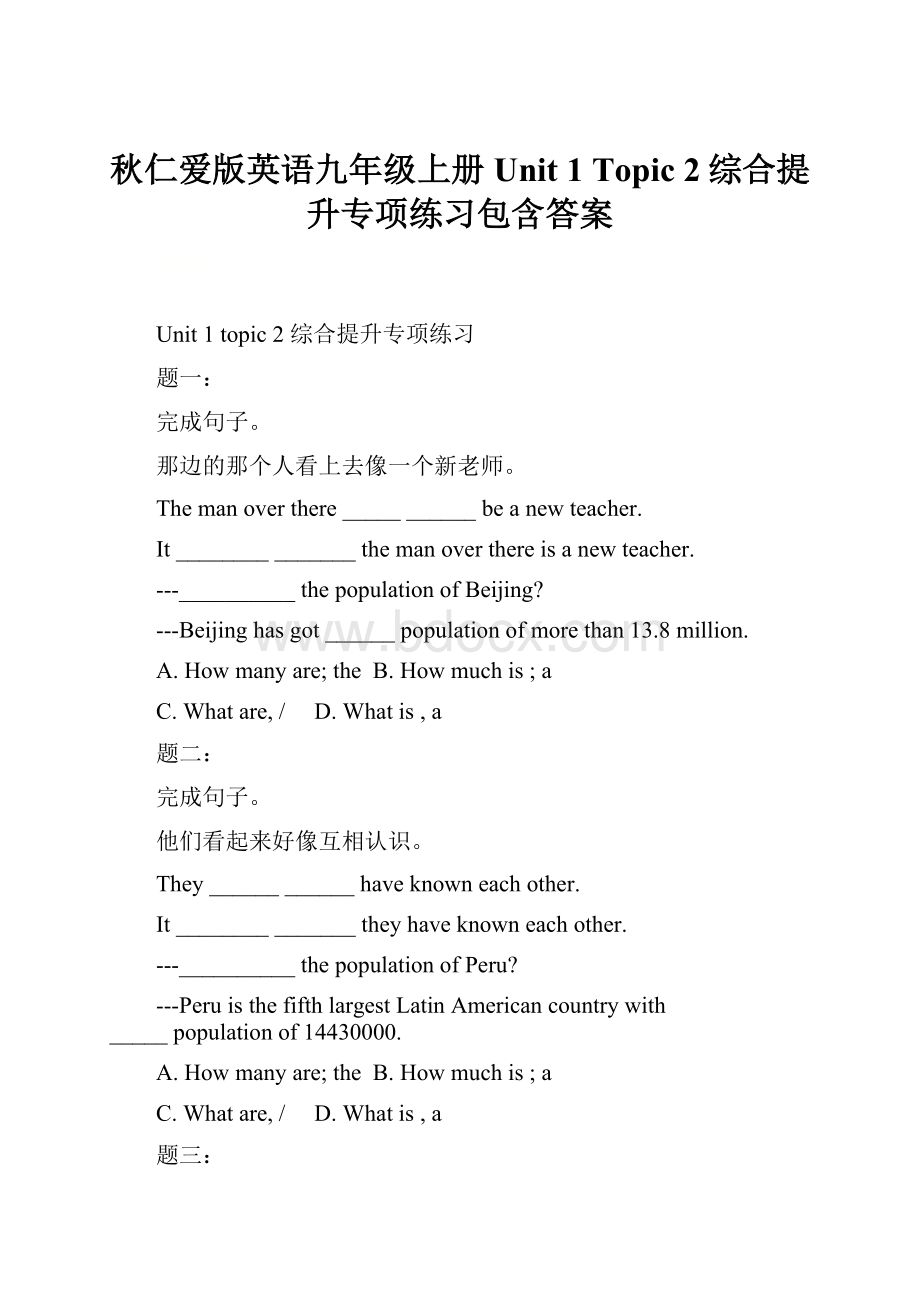秋仁爱版英语九年级上册Unit 1 Topic 2综合提升专项练习包含答案.docx
《秋仁爱版英语九年级上册Unit 1 Topic 2综合提升专项练习包含答案.docx》由会员分享,可在线阅读,更多相关《秋仁爱版英语九年级上册Unit 1 Topic 2综合提升专项练习包含答案.docx(10页珍藏版)》请在冰豆网上搜索。

秋仁爱版英语九年级上册Unit1Topic2综合提升专项练习包含答案
Unit1topic2综合提升专项练习
题一:
完成句子。
那边的那个人看上去像一个新老师。
Themanoverthere___________beanewteacher.
It_______________themanoverthereisanewteacher.
---__________thepopulationofBeijing?
---Beijing has got ______ population of more than 13.8 million.
A.Howmanyare;theB.Howmuchis;a
C.Whatare,/D.Whatis,a
题二:
完成句子。
他们看起来好像互相认识。
They ____________ haveknown each other.
It_______________theyhaveknowneach other.
---__________thepopulationofPeru?
---PeruisthefifthlargestLatinAmericancountrywith_____ population of14430000.
A.Howmanyare;theB.Howmuchis;a
C.Whatare,/D.Whatis,a
题三:
________theloveandencouragementofhermother,shefinallydefeatedthediseaseandfacedthedisabilitybravely.
A.ThankforB.Thanksfor
C.ThanksD.Thanksto
用动词的适当形式填空。
Thelady____________(call)Mary.
Thelady__________(call)MaryismyEnglishteacher.
题四:
________youradvice,Icansolvetheproblems.
A.ThankforB.Thanksfor
C.ThanksD.Thanksto
用动词的适当形式填空。
Thelittlegirl____________(call)Lucy.
Thelittlegirl__________(call)Lucyismysister.
题五:
never,ever,already,just,yet,for,since
Theyhave_____beentoYan’anbefore.It’ssuchabeautifulcitythatIhopetogotheresomeday.
Ihave_____broughtmycartothegarage.
The Smiths havebeen in China ______ 8 years.
“Have you ________ been to the US?
” “No,Ihave________beenthere.”
“Hasheseenthefilm_______?
”“Yes,hehas______seenit.”
题六:
never,ever,already,just,yet,for,since
My father has _____been to the Great Wall before,andhehopestobethere.
Zhao Lan has ______studiedin this school for two years.
I have stayed at my aunt’s _____ two weeks.
“Have you ________ been to Harbin?
” “No,Ihave________beenthere.”
“Have they taken down the old pictures ___ ?
”“ Yes, they have____takendown.”
题七:
--Do you know Lydia very well?
--Yes, She and I _____ friends since we were very young.
A.made B. become
C. have been D. turned
---______ you ______(see) the film before?
---Yes.I______itlastweek.
A.Have;seen;sawB.Had;seen;haveseen
C.Did;see;sawD.Did;see;haveseen
--When ______ she ______?
--Two hours ago.
A.did...leaveB.does...leave
C.has...leftD.had...left
They ______ each other for about ten years.
A.knewB.haveknown
C.mustknowD.willknow
题八:
I ______ today’s homework already. What about you?
A. have finished B. finish
C. to finish D. Finishing
—______ to the United States?
—No, never, but I _____ to Canada a few years ago.
A. Have you been;went B. Have you gone;havegone
C. Did you go;went D. Will you go;went
---________ you _______ the football match yesterday?
---Yes, I did. It was great.
A. Did; see B. Have; seen
C. Will; see D. Were; seen
I won’t go to see the film tonight because I ______ my ticket.
A. didn’t lose B. have lost
C. will lose D. didn’t have
题九:
1isaresultofthestudentactivitysurveyatourschool.Moststudentsexercisethreeorfourtimes2week.Somestudentsexerciseonce3twiceaweek.Somestudentsexerciseeveryday.4homework,moststudents5homeworkeveryday.Somestudentsdohomeworkmorethanthreetimes.6studentsdohomeworkonceortwiceaweek.Theresultfor“watchTV”is7.SomestudentswatchTVonceortwiceaweek.SomewatchTVthreeorfour8aweek.ButmoststudentswatchTVeveryday.9thinkit’shelpfulforthem10TV.Theycanberelaxedandlearnmuchknowledge(知识)bywatchingTV.
1.A.HereB.ThereC.Here’sD.There’s
2.A.aB.anC.theD./
3.A.andB.butC.orD.so
4.A.WithB.ByC.ToD.Asfor
5.A.didB.doC.doesD.doing
6.A.NotB.NoC.NoofD.Noone
7.A.interestingB.interestsC.interested
D.interest
8.A.timeB.timesC.atimeD.sometime
9.A.TheyB.TheirC.ThemD.Theirs
10.A.watchB.towatchC.watchesD.watching
题一十:
Once,therewasawilddonkey(驴)andatame(驯养的)donkey.
Thewilddonkeywasthinandsmall.Hespenthislifeinthe1.Thegrassonthehillwashisfoodalltheyeararound.Sometimes,hehadtowalkmilestofindcleanwaterandatnighttherewasalways2fromlions.Thetamedonkeywasmuchfatterand3.Duringsummer,theownerfedhimgrasswhilein4,hewasgivencornandhay(干草)toeat.Therewasalwayscleanwaterforhimto5andatnighthestayedinsidesafely.
Thewilddonkeyalwayswishedhecouldlive6thetamedonkey.
Oneday,thewilddonkeywaslookingforgrassonthehill.Lookingdown,hesawthetamedonkeywalkingslowlyalongtheroad,7heavywood.Ashewatched,thetamedonkeystoppedtoeatsome8bytheroadside.Suddenly,hisownerbegantodrivehimwitha9.
“Idon’twantyourwayoflife,”thoughtthewilddonkey.“Iseethatyouhavetopay10forthefoodtheygiveyou.”
1.A.houseB.zooC.wildD.river
2.A.dangerB.noiseC.drinkD.food
3.A.tallerB.shorterC.weakerD.stronger
4.A.springB.summerC.autumnD.winter
5.A.eatB.smellC.drinkD.feel
6.A.withB.withoutC.likeD.unlike
7.A.cuttingB.carryingC.eatingD.burning
8.A.grassB.meatC.fishD.water
9.A.stickB.knifeC.forkD.string
10.A.easyB.easilyC.heavyD.heavily
题一:
seemsto;seemsthat;D
解析:
1.seemto...或Itseemsthat...都可以表示“好像......”。
2.seemto...或Itseemsthat...都可以表示“好像......”。
3.提问人口的数量时,用疑问词What;population of 后跟数词时,前面要用不定冠词a.
题二:
seemto;seemsthat;D
解析:
1.seemto...或Itseemsthat...都可以表示“好像......”。
2.seemto...或Itseemsthat...都可以表示“好像......”。
根据后面的
3.提问人口的数量时,用疑问词What;population of 后跟数词时,前面要用不定冠词a.
题三:
D;iscalled;called
解析:
1.表示“多亏,由于”,使用Thanksto。
2.句中没有谓语,所以用iscalled.
3.句中已经有谓语,此处用called,过去分词作定语。
题四:
D;iscalled;called
解析:
1.表示“多亏,由于”,使用Thanksto。
2.句中没有谓语,所以用iscalled.
3.句中已经有谓语,此处用called,过去分词作定语。
题五:
never;already;for;ever;never;yet;already
解析:
1.句意为“他们以前从没有去过延安。
我希望有一天可以去那座美丽的城市”。
2.句意为“我已经把车带到修车厂”。
3.for后加时间段。
4.句意为“你曾经去过美国吗?
没有,我从没去过那”。
5.yet用于一般疑问句中。
already用于肯定句。
题六:
never;already;for;ever;never;yet;already
解析:
1.句意为“我爸爸以前从没去过长城,他想去那”。
2.句意为“张兰已经在这所学校学习两年了”。
3.for后加时间段。
4.句意为“你曾经去过哈尔滨吗?
没有,我从没去过那”。
5.yet用于一般疑问句中。
already用于肯定句。
题七:
CAAB
解析:
1.根据since可知为现在完成时。
2.根据句意可知,上句为现在完成时,根据时间状语lastweek可知后句为一般过去时。
3.根据时间状语Two hours ago可知为一般过去时。
4.for加一段时间通常和现在完成时连用。
题八:
AAAB
解析:
1.根据时间状语already可知为现在完成时。
2.根据句意可知,上句为现在完成时,根据时间状语ago可知后句为一般过去时。
3.根据时间状语yesterday可知为一般过去时。
4.根据句意可知为现在完成时,对现在造成了影响。
题九:
1-5AACDB6-10BABAB
解析:
1.考查名词及语境理解。
由文章后面内容得知,这是一篇调查结果。
句意:
这是一篇我们学校学生活动的调查结果。
A这里;B那里;C这是;D那是;由于句中已经有系动词is,所以选A。
2.考查冠词及语境理解。
由后面的week周,以及前面的threeorfourtimes三到四次可以看出,此句为:
大多数学生一周锻炼三到四次。
Threeorfourtimesaweek,一周三到四次。
故选A。
3.考查连词及语境理解。
从前文的once一次,及后面twice两次可以得出答案,此句为:
有些学生一周锻炼一到两次。
A和;B但是;C或者;D所以;故选C。
4.考查介词及语境理解。
从文中后文可知,后面写的是关于家庭作业的,句意:
至于家庭作业,很多学生……;A和;B通过;C到;D至于,关于;故选D。
5.考查动词及语境理解。
从后文Somestudentsdohomeworkmorethanthreetimes一些学生一周做家庭作业超过三次。
可知此句也是关于做家庭作业的,句意:
大多数学生每天做作业。
主语是moststudents,是复数,所以谓语动词用原形,故选B。
6.考查代词及语境理解。
从给出的选项可知此句:
没有学生一周只做一两次作业。
A不,是副词,不能做主语;B不是,形容词,不做主语;C没有…of后面要接宾语;D没有人,后不能跟名词。
故选B。
7.考查形容词及语境理解。
从给出的选项得知此句为:
关于看电视的调查很有趣。
A有趣的,形容词,用来形容物;B使感兴趣,动词;C感兴趣的,形容词,用来形容人;D使感兴趣,动词;结合题意,这里要用形容词修饰result,故选A。
8.考查名词及语境理解。
结合前文知道,这里讲的都是学生看电视的次数,所以此句为:
一些人一周看三到四次电视。
A时间,次数,是单数;B次数,复数;C一段时间;
D一些时间;结合题意选B。
9.考查代词及语境理解。
结合选项可知此句为:
他们认为看电视对他们有帮助.A他们,主格;B他们的,形容词性物主代词;C他们,宾格;D他们的,名词性物质代词。
句中缺主语,故选A。
10.考查动词及语境理解。
结合选项意思,此句为:
他们认为看电视对他们有帮助。
It’shelpfulforsb.todosth.做某事对某人是有帮助的。
后面用动词不定式,故选B。
题一十:
1-5CADDC6-10CBAAD
解析:
1.考查语境理解及名词。
house房子;zoo动物园;wild荒野;river河流。
联系前一句描述,可知此处指的是,这头野生的驴生活在荒野当中。
故选C。
2.考查语境理解及名词。
danger危险;noise噪音;drink饮料;food食物。
联系下文,可知此处指的是,来自狮子的危险。
故选A。
3.考查语境理解及形容词。
taller更高的;shorter更矮的;weaker更虚弱的;stronger更强壮的。
联系前文fatter,可知此处指的是,更胖更强壮。
故选D。
4.考查语境理解及名词。
spring春天;summer夏天;autumn秋天;winter冬天。
联系下文,给它谷物和干草吃。
可知此处指的是冬天。
故选D。
5.考查语境理解及动词。
eat吃;smell闻起来;drink喝,饮用;feel感觉。
联系前文,可知此处指的是,它总有干净的水喝。
故选C。
6.考查语境理解及介词;with带有,伴随;without没有;like像……一样;unlike和……不同,不像。
结合语境可知此处指的是,他希望他能像被驯养的驴一样生活。
故选C。
7.考查语境理解及动词。
cutting砍;carrying运送,携带;eating吃;burning燃烧,灼伤。
结合语境可知此处指的是,这头被驯养的驴正在运送沉重的木头。
故选B。
8.考查语境理解及名词。
grass青草;meat肉;fish鱼;water水。
结合语境可知此处指的是,这头驴停下来吃路边的草。
故选A。
9.考查语境理解及名词。
stick木棍,棒子;knife小刀;fork叉子;string线,细绳。
结合语境可知此处指的是,驴的主人用棍子驱赶这头驴。
故选A。
10.考查语境理解及形容词副词辨析。
easy形容词,容易的;easily副词,容易地;heavy形容词,沉重的;heavily副词,沉重地、猛烈地。
结合语境可知此处指的是,你必须沉重地付出。
故选D。